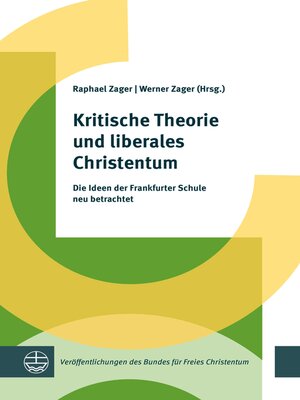Kritische Theorie und liberales Christentum
ebook ∣ Die Ideen der Frankfurter Schule neu betrachtet · Veröffentlichungen des Bundes für Freies Christentum
By Raphael Zager

Sign up to save your library
With an OverDrive account, you can save your favorite libraries for at-a-glance information about availability. Find out more about OverDrive accounts.
Find this title in Libby, the library reading app by OverDrive.



Search for a digital library with this title
Title found at these libraries:
| Library Name | Distance |
|---|---|
| Loading... |
1924 wurde das Frankfurter Institut für Sozialforschung eröffnet, von dem eine sozialphilosophische Strömung ausging, die als »Frankfurter Schule« bezeichnet wird. Als programmatisches Leitwort verbindet sich mit ihr der von Max Horkheimer geprägte Begriff »Kritische Theorie«. Neben Horkheimer gehörten zur ersten Generation der Frankfurter Schule Theodor W. Adorno, Herbert Marcuse, Erich Fromm und Walter Benjamin, während der bekannteste Vertreter der zweiten Generation Jürgen Habermas ist.
Obwohl die Kritische Theorie in ihren Anfängen religionskritisch eingestellt war, gewannen später theologische Motive an Bedeutung. Nicht zuletzt ist es Jürgen Habermas, der das Gespräch mit der Theologie sucht, obwohl er sich selbst als »religiös unmusikalisch« beurteilt. Das 100-jährige Jubiläum der Frankfurter Schule ist für ein liberales Christentum Anlass, sich neu mit ihren Vertretern zu befassen. [Critical Theory and Liberal Christianity. The Ideas of the Frankfurt School revisited] In 1924, the Frankfurt Institute for Social Research was opened, which gave rise to a socialphilosophical movement known as the »Frankfurt School«. The term »critical theory« coined by Max Horkheimer is associated with it as a programmatic motto. In addition to Horkheimer, the first generation of the Frankfurt School included Theodor W. Adorno, Herbert Marcuse, Erich Fromm and Walter Benjamin, while the best-known representative of the second generation is Jürgen Habermas. Although critical theory was initially critical of religion, theological motives later became more important. Last but not least, it is Jürgen Habermas who seeks dialogue with theology, even though he judges himself to be »religiously unmusical«. The 100th anniversary of the Frankfurt School is an opportunity for liberal Christianity to take a new look at its representatives.







